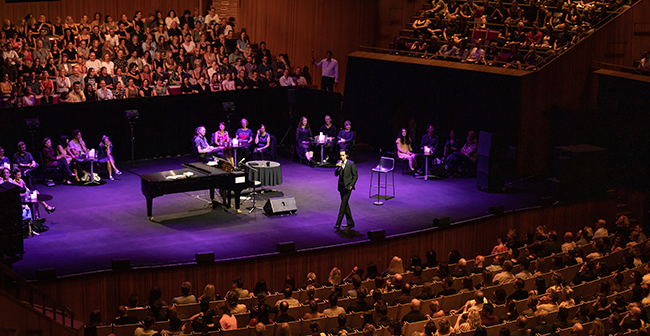Music
 Nick Cave at the Syndey Opera House // Photo: Daniel Boud
Nick Cave at the Syndey Opera House // Photo: Daniel Boud
Nick Cave Connects Through Conversation at Lincoln Theatre
September 23, 2019 @ 12:00am
Dressed in his usual Edwardian undertaker garb, Nick Cave’s speaking tour transcended from an intimate cabaret performance complete with small cafe tables and audience members seated onstage into something more spiritual, a wake for the living, a church tent revival. Open, raw, vulnerable, the recurring themes of religion, loss, despair, “reaching for something more,” and a wistful hopefulness connected Cave and the audience in a secular mass at Lincoln Theatre.
“It’s an experiment to see what will happen,” Nick Cave stated about the “Conversations with Nick Cave” tour’s unique format: Audience members ask questions; no subject is off-limits, and yes, there are some songs, although it’s mostly a speaking tour. “It’s terrifying.”
Armed with flashing light sticks, ushers walked around the audience, signaling when devotees were ready to speak. Instead of a traditional question and answer format, this was a call and response, with speakers holding onto the microphone, with soft affirmations as Cave answered or additional questions, developing a fleeting, but meaningful conversation. There were song requests, often fulfilled by Cave, who shuffled through stacks of sheet music before sitting at his piano.
At times he laughed off the loving cacophony of many fans shouting various song requests at once with “I can’t play that. I can’t play that.” But, he answered as many questions as possible with candor, from his inclusion on the Shrek 2 soundtrack to his feelings about the increasingly polarizing politics of Morrissey and whether a 12 year old should read Dostoevsky (“Read. Any book. Read!”) to his own controversial decision to play Israel.
Occasionally, Cave deflected, as when asked about when the next Bad Seeds’ record would appear. (On Monday morning, he announced an upcoming Bad Seeds’ double album Ghosteen to be released at the end of September. This, too, was prompted by a fan question on his epistolary blog The Red Hand Files.)
The “Conversations with Nick Cave” tour is a reformatted version of The Red Hand Files, in which people write questions, and Cave answers in short essays about the meaning of song lyrics or advice for the lovelorn, receiving and reading 50 or so questions a day. Here he acts as editor, choosing which queries to answer, and taking the time to reflect before composing and revising his responses. The Red Hand Files has become a “necessary part of my life in a weird sort of way,” he explained about the ongoing project.
“Conversations with Nick Cave,” however, is a testament in faith: the belief that his audience will ask the right questions and that he may provide the answers without the meditation of time.
“The questions are more interesting than the answers themselves,” he stated. “It’s a real act of courage.”
“My only personal need is mirrored in the audience, a need towards something higher” Cave explained to the audience, sounding ever more like a preacher. “Collectively, we are in this together. After the death of my child, I saw this in another way. What happened to me will happen to everybody. Despair can be a beautiful thing: there are pinpricks of hope or one can collapse into despair or grow into something beautiful.”
Over the course of three hours, the audience experienced Cave’s agonies and ecstasies, garnering insight into his songwriting process, when asked about the movement from his earlier narrative compositions to lyrical works: “My writing now is porous, a conversation, a dialogue, but your imaginative input is important.”
One audience question prompted him to reflect upon the masculine violence in his Murder Ballads, while another led him to divulge how hearing Leonard Cohen “freed” him from the “thread of unease” in his otherwise “beautiful, sunshine” youth.
These questions and answers were punctuated by his own hymnals from “Love Letter” and “God is in the House,” to a rousing “Stagger Lee” and haunting “Mercy Seat,” in addition to Leonard Cohen’s “Avalanche” and the recently departed Daniel Johnston’s “Devil Town” that surprised everyone, including the audience member who brought up Johnston only moments before the impromptu song was played.
There were humorous anecdotes about his misbegotten drug-fueled time in Berlin, Germany to composing his novels while taking “a lot of amphetamines and the only book around was a thesaurus.” There was crushing honesty when he discussed the untimely death of his teenage son four years ago, and the deep and continued love affair with his wife, Susie Bick: “she’s with me, she’s always with me.”
The worst has happened to him, and with the love of his family, and his belief in “something beyond,” Cave has found this new vocation, this calling to listen, answer, sing.
“Atheism is very bad for the business of songwriting. It’s hard to write believing nothing,” he jested when asked about his own religious beliefs. After a brief pause, he countered that with a moment of clarity and spiritual honesty. “I’m interested in the reach – the yearning, the reach for something else, and if you take that yearning away, you take away my songwriting.”
For more information about Nick Cave’s “Conversations with Nick Cave” tour, visit his website or follow him on Twitter.







